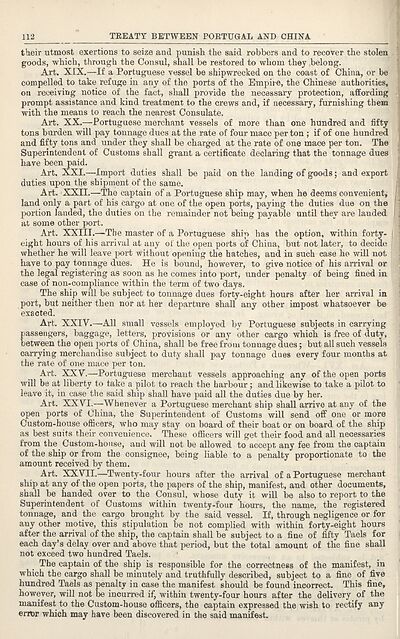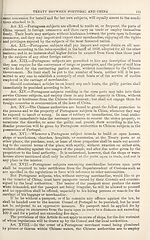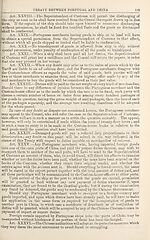1926
(164) Page 112
Download files
Complete book:
Individual page:
Thumbnail gallery: Grid view | List view

112
TREATY BETWEEN PORTUGAL AND CHINA
their utmost exertions to seize and punish the said robbers and to recover the stolen
goods, which, through the Consul, shall be restored to whom they belong.
Art. XIX.—If a Portuguese vessel be shipwrecked on the coast of China, or be
compelled to take refuge in any of the ports of the Empire, the Chinese authorities,
on receiving notice of the fact, shall provide the necessary protection, affording
prompt assistance and kind treatment to the crews and, if necessary, furnishing them
with the means to reach the nearest Consulate.
Art. XX.—Portuguese merchant vessels of more than one hundred and fifty
tons burden will pay tonnage dues at the rate of four mace per ton ; if of one hundred
and fifty tons and under they shall be charged at the rate of one mace per ton. The
Superintendent of Customs shall grant a certificate declaring that the tonnage dues
have been paid.
Art, XXI.—Import duties shall be paid on the landing of goods; and export
duties upon the shipment of the same.
Art. XXII.—The captain of a Portuguese ship may, when he deems convenient,
land only a part of his cargo at one of the open ports, paying the duties due on the
portion landed, the duties on the remainder not being payable until they are landed
at some other port.
Art. XXIII.—The master of a Portuguese shin has the option, within forty-
eight hours of his arrival at any of the open ports of China, but not later, to decide
whether he will leave port without opening the hatches, and in such case he will not
have to pay tonnage dues. He is bound, however, to give notice of his arrival or
the legal registering as soon as he comes into port, under penalty of being fined in
case of non-compliance within the term of two days.
The ship will be subject to tonnage dues forty-eight hours after her arrival in
port, but neither then nor at her departure shall any other impost whatsoever be
exacted.
Art. XXIV.—All small vessels employed by Portuguese subjects in carrying
passengers, baggage, letters, provisions or any other cargo which is free of duty,
between the open ports of China, shall be free from tonnage dues; but all such vessels
carrying merchandise subject to duty shall pay tonnage dues every four months at
the rate of one mace per ton.
Art. XXV.—Portuguese merchant vessels approaching any of the open ports
will be at liberty to take a pilot to reach the harbour; and likewise to take a pilot to
leave it, in case the said ship shall have paid all the duties due by her.
Art. XXVI.—Whenever a Portuguese merchant ship shall arrive at any of the
open ports of China, the Superintendent of Customs will send off one or more
Custom-house officers, who may stay on board of their boat or on board of the ship
as best suits their convenience. These officers will get their food and all necessaries
from the Custom-house, and will not be allowed to accept any fee from the captain
of the ship or from the consignee, being liable to a penalty proportionate to the
amount received by them.
Art. XXVII.—Twenty-four hours after the arrival of a Portuguese merchant
ship at any of the open ports, the papers of the ship, manifest, and other documents,
shall be handed over to the Consul, whose duty it will be also to report to the
Superintendent of Customs within twenty-four hours, the name, the registered
tonnage, and the cargo brought by the said vessel. If, through negligence or for
any other motive, this stipulation be not complied with within forty-eight hours
after the arrival of the ship, the captain shall be subject to a fine of fifty Taels for
each day’s delay over and above that period, but the total amount of the fine shall
not exceed two hundred Taels.
The captain of the ship is responsible for the correctness of the manifest, in
which the cargo shall be minutely and truthfully described, subject to a fine of five
hundred Taels as penalty in case the manifest should be found incorrect. This fine,
however, will not be incurred if, within twenty-four hours after the delivery of the
manifest to the Custom-house officers, the captain expressed the wish to rectify any
error which may have been discovered in the said manifest.
TREATY BETWEEN PORTUGAL AND CHINA
their utmost exertions to seize and punish the said robbers and to recover the stolen
goods, which, through the Consul, shall be restored to whom they belong.
Art. XIX.—If a Portuguese vessel be shipwrecked on the coast of China, or be
compelled to take refuge in any of the ports of the Empire, the Chinese authorities,
on receiving notice of the fact, shall provide the necessary protection, affording
prompt assistance and kind treatment to the crews and, if necessary, furnishing them
with the means to reach the nearest Consulate.
Art. XX.—Portuguese merchant vessels of more than one hundred and fifty
tons burden will pay tonnage dues at the rate of four mace per ton ; if of one hundred
and fifty tons and under they shall be charged at the rate of one mace per ton. The
Superintendent of Customs shall grant a certificate declaring that the tonnage dues
have been paid.
Art, XXI.—Import duties shall be paid on the landing of goods; and export
duties upon the shipment of the same.
Art. XXII.—The captain of a Portuguese ship may, when he deems convenient,
land only a part of his cargo at one of the open ports, paying the duties due on the
portion landed, the duties on the remainder not being payable until they are landed
at some other port.
Art. XXIII.—The master of a Portuguese shin has the option, within forty-
eight hours of his arrival at any of the open ports of China, but not later, to decide
whether he will leave port without opening the hatches, and in such case he will not
have to pay tonnage dues. He is bound, however, to give notice of his arrival or
the legal registering as soon as he comes into port, under penalty of being fined in
case of non-compliance within the term of two days.
The ship will be subject to tonnage dues forty-eight hours after her arrival in
port, but neither then nor at her departure shall any other impost whatsoever be
exacted.
Art. XXIV.—All small vessels employed by Portuguese subjects in carrying
passengers, baggage, letters, provisions or any other cargo which is free of duty,
between the open ports of China, shall be free from tonnage dues; but all such vessels
carrying merchandise subject to duty shall pay tonnage dues every four months at
the rate of one mace per ton.
Art. XXV.—Portuguese merchant vessels approaching any of the open ports
will be at liberty to take a pilot to reach the harbour; and likewise to take a pilot to
leave it, in case the said ship shall have paid all the duties due by her.
Art. XXVI.—Whenever a Portuguese merchant ship shall arrive at any of the
open ports of China, the Superintendent of Customs will send off one or more
Custom-house officers, who may stay on board of their boat or on board of the ship
as best suits their convenience. These officers will get their food and all necessaries
from the Custom-house, and will not be allowed to accept any fee from the captain
of the ship or from the consignee, being liable to a penalty proportionate to the
amount received by them.
Art. XXVII.—Twenty-four hours after the arrival of a Portuguese merchant
ship at any of the open ports, the papers of the ship, manifest, and other documents,
shall be handed over to the Consul, whose duty it will be also to report to the
Superintendent of Customs within twenty-four hours, the name, the registered
tonnage, and the cargo brought by the said vessel. If, through negligence or for
any other motive, this stipulation be not complied with within forty-eight hours
after the arrival of the ship, the captain shall be subject to a fine of fifty Taels for
each day’s delay over and above that period, but the total amount of the fine shall
not exceed two hundred Taels.
The captain of the ship is responsible for the correctness of the manifest, in
which the cargo shall be minutely and truthfully described, subject to a fine of five
hundred Taels as penalty in case the manifest should be found incorrect. This fine,
however, will not be incurred if, within twenty-four hours after the delivery of the
manifest to the Custom-house officers, the captain expressed the wish to rectify any
error which may have been discovered in the said manifest.
Set display mode to:
![]() Universal Viewer |
Universal Viewer | ![]() Mirador |
Large image | Transcription
Mirador |
Large image | Transcription
Images and transcriptions on this page, including medium image downloads, may be used under the Creative Commons Attribution 4.0 International Licence unless otherwise stated. ![]()
| Asian directories and chronicles > 1926 > (164) Page 112 |
|---|
| Permanent URL | https://digital.nls.uk/196490305 |
|---|
| Attribution and copyright: |
|
|---|---|
| Description | Volumes from the Asian 'Directory and Chronicle' series covering 1917-1941, but missing 1919 and 1923. Compiled annually from a multiplicity of local sources and research. They provide listings of each country's active corporations, foreign residents and government agencies of all nationalities for that year, together with their addresses. Content includes: various treaties; coverage of conflicts; currencies and taxes; consular fees; weights and measures; public holidays; festivals and traditions. A source of information for both Western states and communities of foreigners living in Asia. Published by Hongkong Daily Press. |
|---|---|
| Shelfmark | H3.86.1303 |
| Additional NLS resources: |

